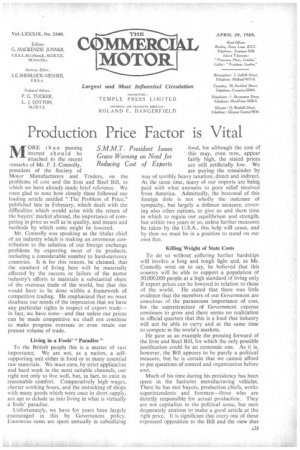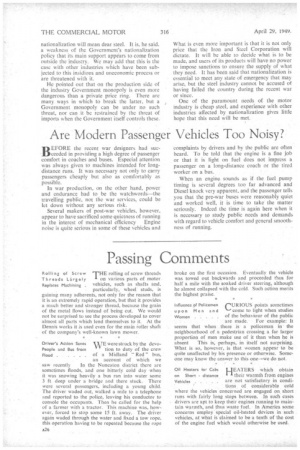Production Price Factor is Vital
Page 1

Page 2

If you've noticed an error in this article please click here to report it so we can fix it.
MORE than passing interest s h ul d be _ attached to the recent remarks of Mr. F. I. Connolly, president of the Society of Motor Manufacturers and Traders, on the problems of cost and the Iron and Steel Bill, to which we have already made brief reference. We were glad to note how closely these followed our leading article entitled "The Problem of Price," published late in Febvuary, which dealt with the difficulties which would arise with the return of the buyers' market abroad, the importance of competing in price as well as in quality, and means and methods by which costs might be lowered.
Mr. Connolly was speaking as the titular chief of an industry which is making an enormous Contribution to the solution of our foreign exchange problems by exporting most of its products, including a considerable number to hard-currency countries. It is for this reason, he claimed, that the standard of living here will be materially affected by the success or failure of the motor industry's efforts to maintain a substantial share of the overseas trade of the world, but that this would have to be done within a framework of competitive trading. He empha'sized that we must disabuse our minds of the impression that we have any. particular rights in respect of export trade— in fact, we have none—and that unless our prices can be made competitive we shall not continue to make progress overseas or even retain our present volume of trade.
Living in a Fools' "Paradise" To the British people this is a matter of vast importance. We are not, as a nation, a selfsupporting unit either in food or in many essential raw materials. We must earn, by strict application and hard work in the most suitable channels, our right not only to live well, but, in fact, to exist in reasonable comfort. Comparatively high wages, shorter working hours; and the restocking of shops with many goods which were once in short supply, are apt to delude us into living in what is virtually a fools' paradise.
Unfortunately, we have for years been largely encouraged in this by Government policy. Enormous sums are spent annually in subsidizing food, for although the cost of this may, even now, appear fairly high, the stated prices are still artificially low. We are paying the remainder by Way of terribly heavy taxation,-direct and indirect. At the same time, many of our imports are being paid with what amounts to poor relief received from America. Admittedly, the bestowal of this foreign dole is not wholly the outcome of sympathy, but largely a defence measure, covering also other nations, to give us and them time in which to regain our equilibrium and strength, but within two years or so, unless further measures be taken by the U.S.A., this help will cease, and by then we must be in a position to stand on our own feet.
Killing Weight of State Costs To do so without suffering further hardships will involve a long and tough fight and, as Mr. Connolly went on to say, he believed that this country will be able to support a population of 50,000,000 people at a high standard of living only if export prices can be lowered in relation to those of the world. He stated that there was little evidence that the members of our Government are conscious of the paramount importance of cost, for the superstructure of Government expense continues to grow and there seems no realization in official quarters that this is a load that industry will not be able to carry and at the same time to compete in the world's markets.
He gave as an example the pressing forward of the Iron and Steel Bill, for which the only possible justification could be an economic one. As it is, however, the Bill appears to be purely a political measure, but he is certain that we cannot afford to put questions of control and organization before cost.
Much of his time during his presidency has been spent in the factories manufacturing vehicles. There he has met buyers, production chiefs, works superintendents and foremen—those who are directly responsible for actual production. They are not capitalists in the political sense, but men desperately anxious to make a good article at the right price. It is significant that every one of these expressed opposition to the Bill and the view that nationalization will mean dear steel. It is, he said, a weakness of the Government's nationalization policy that its main support appears to come from outside the industry. We may add that this is the case with other industries which have been subjected to this insidious and uneconomic process or are threatened with it.
He pointed out that on the production side of the industry Government monopoly is even more dangerous than a private price ring. There are many ways in which to break the latter, but a Government monopoly can be under no such threat, nor can it be restrained by the threat of imports when the Government itself controls these. What is even more important is that it is not only price that the Iron and Steel Corporation will dictate. It will be able to decide what is to be made, and users of its products will have no power to impose sanctions to ensure the supply of what they need. It has been said that nationalization is essential to meet any state of emergency that may arise; but the steel industry cannot be accused of having failed the country during the recent war or since.
One of the paramount needs of the motor industry is cheap steel, and experience with other industries affected by nationalization gives little hope that this need will be met.


























